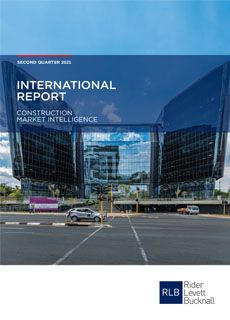According to the Rider Levett Bucknall (RLB) 2nd Quarter 2021 International Report, while the NZ construction market has navigated the COVID-19 pandemic well, labour shortages coupled with global supply chain disruptions continue to put pressure on construction costs.
Mr Steve Gracey, Managing Director of Rider Levett Bucknall New Zealand said, “While there was a decline in the volume of construction activity in the last quarter of 2020 and into 2021, with a number of large projects completing, most contractors were able to trade through what has been a challenging and uncertain time and the forward pipeline of work is strong.”
“That said, over the last few months there has been significant supply chain issues since the lockdown causing delays, uncertainty, and increased cost,” he added.
Renewed growth within education, health and social housing
Market sectors such as office, hotel and retail, which have been strong over the last few years have rapidly declined because of the pandemic, but there is renewed growth within the education, health, and social housing sectors. Recent traditional sectors of industrial and civil/ infrastructure also continue to be strong. A key example is Auckland Airport’s $1billion plans to replace its ageing domestic terminal and merge it with the international terminal building.
Commercial and Retail sectors remain reasonably flat while Education continues to provide a steady pipeline of work going forward with the schools rebuild projects continuing.
Mr Gracey continued, “We are now seeing other cost pressures within the industry led by significant supply chain issues and associated shipping costs, international commodity prices and increasing local labour and compliance costs.”
Delays in container ships departing from (and arriving at) global maritime ports due to COVID-19 issues are adversely impacting construction material costs. RLB has seen three to four actual and planned price rises on some steel and timber products in Q2 and Q3.
Construction demand unprecedented
According to the firm, there is a clear demand/supply equation imbalance with not enough key construction materials being fabricated to meet demand. There is a lack of significant components, like glue for stand board and paper for plasterboard.
Whilst construction demand is unprecedented, factories have reduced production at various times in New Zealand and Australia and beyond due to a lack of materials, labour or available storage for export goods.
RLB has seen a 50 to 60% cost increase in the supply price of steel since October last year and some timber products 15 to 20% increase so far this year.
Commodity prices to remain high
As governments stimulate other economies and as borders open, RLB expects that commodity prices however will remain high. The legislated rise in the minimum wage and skilled labour shortages will continue to put pressure on labour costs, particularly as the industry becomes busier towards the end of 2021 with the border likely to remain closed to migrant workers.
The initial post lockdown recovery and lower tender pricing seen in the middle to later part of last year has now passed. The booming residential sector and infrastructure spend coupled with higher material costs and labour costs will drive escalation over the next one to two years.
RLB’s forecast for Auckland’s TPI inflation over 2021 is 5% and remaining relatively high at 4.5% through until the end of 2022. Recent TPI movements in Christchurch have been relatively flat and while there have been several isolated specific trade related cost increases, this has not been across the board.
As a summary, RLB is forecasting the following construction cost growth:
- In 2021, of 5.0% for Auckland, 3.0% for Christchurch and 2.5% for Wellington.
- In 2022, of 4.0% for Auckland, 4.0% for Christchurch and 3.0% for Wellington.
- In 2023, of 2.5% for Auckland, 3.0% for Christchurch and 3.0% for Wellington.
FURTHER INFORMATION:



